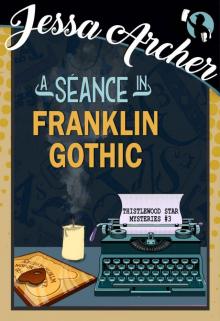- Home
- Jessa Archer
Arsenic and Ole Page 2
Arsenic and Ole Read online
Page 2
“Well, thanks for letting me—”
“Audra!” Mrs. Whitley, who was now standing in the doorway holding Leo, cast a scathing look in my direction and then turned back toward her daughter. “Would you stop dawdling? Rick has to leave soon, and he’s waiting for that newspaper!”
“Heavens forbid Rick has to wait for something,” Audra muttered so softly I could barely make out the words.
Leo leapt from Mrs. Whitley’s arms and barreled down the drive. Based on past experience, I expected him to take a victory lap around the block to celebrate his escape. But the little dog halted at Audra’s feet, wriggling enthusiastically.
“Hi, Leo!” She scooped him up, planted a kiss into the mane that surrounded his tawny face, and then headed into the house with the dog and Rick’s newspaper, cooing about what a very good boy Leo was.
“I got the note you left in my mailbox,” Mrs. Whitley told me after Audra was inside with the dog. Even at eight thirty in the morning, the woman was impeccably dressed, in a crisp green jumpsuit. “I’ve a good mind to report you for tampering with the mail. Putting something into another person’s box is a federal crime, in case you aren’t aware. And even though you never bothered to ask, my answer is no.”
“Your answer to…what?” I asked. The message I’d left in her box the day before was simply a courtesy notice that Paige was having her sixteenth birthday party and that there might be a bit of extra noise, along with some cars parked in the cul-de-sac. I’d promised that the party would end by eleven and that I’d try to get them to keep the music at a reasonable level. And I’d said that I’d be sending over a small gift to thank them for being understanding.
Maybe she meant that she didn’t want the gift?
“The answer to whether you can have this party,” she said, crossing her arms. “My answer is no. According to the HOA bylaws, unless you’ve gotten approval in advance from the HOA and any proximate neighbors, you cannot have a gathering of more than fifteen people. You did not clear this party with the HOA. I know that for certain, because I called to check. And either way, it wouldn’t matter, because you are required to seek my approval, in writing, two weeks prior to the event. And as I’ve just noted, you do not have my approval.”
I gave her a wide, humorless smile. “Well, then it’s a good thing that we’re only expecting fourteen people, isn’t it?”
That might have been a lie. Paige had invited sixteen people, but several had said they couldn’t make it. I’d ordered the taco bar for twenty, because teens can be bottomless pits, and leftovers were never a bad thing, especially with an additional person in the house this week and the fact that my schedule for the next two days was kind of busy. It might be Paige and Delaney’s spring break, but mine was already over.
An elderly couple who lived at the far end of the cul-de-sac strolled by, studiously pretending not to be listening to our conversation. The old man gave me a sympathetic smile, but his wife kept her eyes pinned to her walking shoes. You could tell from her expression that she’d locked horns with Rebecca Whitley in the past. I suspected she and her husband were both relieved that someone else was in the line of fire.
Whitley’s eyes had narrowed to tiny slits when I looked back. “I don’t believe you. And I will file a grievance if there are more than fifteen at your house. Don’t think for a minute that I’ve forgotten your thinly veiled threats against my Leo. In fact, if I wasn’t already quite certain who poisoned him last Sunday, I would have put you at the very top of my list of suspects.”
“Poisoned?” I exclaimed. “You’ve got to be kidding me.”
“I most certainly am not kidding you. Leo had to have his little tummy pumped out, and he’s still not back to normal. We nearly lost him. And please don’t pretend you care, Tig Alden. I know exactly how you feel about my little Leo.”
Admittedly, Leo was not my favorite canine. He tormented Attila, deposited his smelly little gifts on my lawn, and had in fact dropped one smack in the middle of my doormat my very first morning in Caratoke. But I suspected his personality flaws were due more to nurture than nature. It was hard to blame the dog when his owner was so clearly at fault.
The woman had also cried wolf on multiple occasions. To hear her tell it, everyone had it in for her, her family, and her darling Leo. Since she’d claimed I was the wolf on one of those occasions, I wasn’t inclined to accept anything she said at face value. And I had a hard time believing that anyone in the neighborhood would poison a dog, even to spite Mrs. Whitley.
“Furthermore,” she continued, “you may think you can do anything you please because you’re dating the chief of police, but the mayor is a close personal friend of mine. I’m one of the top donors for his reelection campaign. His wife and I even play golf together. If I call Peggy with a complaint, I can assure you it will be heard by her husband without delay. I’ll have Mayor Winstead direct the police to break up the party immediately if your daughter and her hooligan friends violate the noise ordinance.”
“Hooligans?” I snorted. Did anyone actually use that word in conversation? It was hard not to laugh out loud.
“Becky.” A man’s voice came from inside the house, and then Rick, AKA the Cowboy, joined her in the doorway. He was a good-looking guy—tall, with a scruffy beard, dressed in jeans and a white shirt. I’d only seen him briefly in the past, and from a distance, but I could now see that he appeared to be a bit younger than Mrs. Whitley. And he did kind of look like the Marlboro Man.
Rick placed a hand on her shoulder. “You’re getting yourself all worked up, hon. Remember what the doctor said about that? You don’t need to argue and threaten. If she breaks the rules, just report her and be done with it.” He had a slow drawl. Not really southern, or at least not the Deep South. Texas, maybe?
Rebecca closed her eyes for a moment and took a deep breath. Then she smiled up at him. “You’re right. I shouldn’t waste my time. Especially when she so clearly thinks she’s above the law.”
She turned to go back inside, but I was angry now and I fired back with just as much venom as she’d sent my way earlier. “Listen here, Becky. I’m legitimately sorry about Leo’s close call. My problem isn’t with him. It’s with you. Maybe you and Rick here should go out tonight. Have dinner. See a movie. Go shopping. Anything that gets you out of the house for a few hours. Because Paige and her friends will be playing music in the backyard. With any luck, they’ll also be laughing and having a good time. They might get a little loud. In fact, I hope they get a little loud, because that’s what you do at fun parties. And let me make this crystal clear. If you do anything, anything at all, to wreck my daughter’s birthday party, you will wish you’d never crossed me. Do you understand?”
Rebecca Whitley sniffed once, eyes blazing. Then she stepped back inside her house without another word and slammed the door.
There was a good chance I’d just made the situation worse. But Rebecca Whitley was a bully. I’d been backing down, trying to be pleasant, even though she steadfastly refused to meet me halfway. I’d dealt with bullies before, so I should have known that wasn’t going to work. If you don’t stand your ground, they’ll push a little further each time.
When I turned back to my car, I saw that the old couple had stopped to see what was going on, probably because I’d raised my voice. They seemed embarrassed that I’d caught them staring, and quickly resumed their morning constitutional. Paige, Delaney, and Attila were also watching from the front window, with Caroline’s ghost directly behind them. The girls were clearly amused at seeing me go off on Mrs. Whitley, but Mom looked worried more than anything else. After several years as the awful woman’s neighbor, I’m sure she was mentally cataloging all the ways in which Whitley could make my life miserable. And she would probably do precisely that. But I was tired of kowtowing to her every unreasonable demand simply to keep the peace. She wasn’t Queen of Seaside Estates, or even Queen of Windward Court. It was high time someone stood up to her.
I resisted
the urge to follow Whitley’s lead and slam the door of the Sonata. I also resisted the urge to peel out of the driveway, mostly because the girls were still watching, and I didn’t want to set a bad example.
It was a good thing Paige had purposefully kept her guest list kind of small, because I hadn’t realized we’d need to clear the party with the neighbors or the HOA. Given the chaos of the move and my mother’s death, I’d barely glanced at the bylaws. Although I did vaguely recall Justin—my very best friend and Paige’s father, at least on paper—saying that he’d had a few choice words with Mrs. Whitley when she complained about the number of people who dropped by the house after Caroline’s funeral.
I’d left the note in Whitley’s mailbox merely as a courtesy. It seemed like the neighborly thing to do. If the house on my right hadn’t been vacant, I’d have left a note for them as well. I’d even gone the extra mile and sent them a small bribe to thank them in advance for tolerating the inconvenience. La Costera, the Mexican place that was catering the taco bar for Paige’s party, didn’t do regular delivery, only takeout. So I’d scheduled with OBXpress, the Outer Banks version of GrubHub, to deliver a bag of tacos and burritos to the Whitleys. I thought it would be a nice thank-you-in-advance gesture for tolerating a few hours of music and mayhem in our backyard. While I’d doubted Becky Whitley would have deigned to eat anything I ordered even before this latest confrontation, I was pretty sure Andrew would scarf it down. Maybe Rick, too. But I might as well pull up the receipt they emailed me to see if I could cancel the peace offering. The food would almost certainly be dumped straight into the trash.
I’d never imagined Rebecca Whitley would be happy about the gathering and had even joked to Travis that she’d probably call in at least one complaint before the night was over. But I’d also never imagined that she’d actually try to veto the party or call in political favors to cancel it. Because seriously, how rotten does someone have to be to try and wreck a girl’s sixteenth birthday party?
Chapter Three
Our next-to-last prospective cast member took to the small stage of the Coastal Playhouse and unfolded the handout, now badly creased and wrinkled, that Ben Baker, my academic assistant and stage manager, had given the group earlier. The sheet included lyrics to a half dozen old-timey melodrama classics. Ben, who had a full year of experience as stage manager, had cautioned me that it was not safe to assume that college students knew the tune to songs like “By the Light of the Silvery Moon,” so we sang them a few times as a group before individual auditions began.
Ben’s single year of experience with the Coastal Playhouse was nearly a full year more than I could claim. I wasn’t new to managing theaters, having spent the past several years as artistic director for the Wildwood Dinner Theatre just outside of Burbank. But I’d been on this particular stage only once, back when I was a little kid. That was the summer I’d become utterly stagestruck, and my father had cashed in on his celebrity as a film star to convince the owner of the theater to let me sing a duet with Melinda Barry as a surprise for my ninth birthday. Melinda was the villainess—or vamp, in melodrama parlance—of the show that season. I had seen the play almost every weekend that summer and had spent hours in front of the mirror in my mom’s room, practicing her every line, every move, every song. While I hadn’t fully understood some of the double entendres, I’d done a decent job of faking it. When the audience applauded after my moment on stage with Melinda Barry, the die was cast and both of my parents realized I’d be following my father’s career path as an actor.
Except in the long run, I’d also followed my mother’s career path as an academic. Managing the Coastal Players was now part of my job as assistant professor in the theater department at Southern Coastal University. In fact, after the recent spate of faculty death and incarceration, I was now the only theater professor. The hiring committee had opted to weight my practical experience on stage and TV—including the five-year stint when I was a teenager as one of the sleuths on Private Eye High—far more heavily than my rather meager academic credentials. Most professors at SCU had PhDs and years of teaching experience. The last time I’d stepped foot in a classroom was nearly two decades back when I completed my master’s degree in theater management. Given that I’d grown up watching the Coastal Players perform, I’d considered the summer assignment managing the melodrama troupe to be a perk, rather than a chore. That apparently hadn’t been the view of some of my predecessors, but I felt much more at home handling auditions, rehearsals, and callbacks than I did handling lectures, exams, and faculty meetings.
I was pretty sure that Marjorie Prendergast, the Dean of Arts and Sciences, had called in a few favors to make the job happen. She was a friend of my mother’s, and Mom had taught psychology at SCU for thirty years prior to her accidental death on campus the previous autumn. Even though there was really no way that Dean Prendergast could have foreseen or prevented Caroline’s death, I think she still felt a bit responsible. And, to be fair, theater is one of those fields where practical experience is at least as important as what you can absorb from books and classrooms.
Desperation also played a secondary role in the university’s decision to hire me, just as it had in my own decision to accept the position. The previous professor quit without notice and then reappeared as a very dead body during my first day on the job. On my end, the owners of the dinner theatre I managed, a business that had been limping along for nearly a decade, decided to stop fighting the inevitable and closed the place down last September. I’d also had a very strong personal incentive for leaving Southern California, since Paige’s biological father was moving back to the area. He didn’t know Paige was his daughter and given that he quite literally kills people as part of his job, I really wanted to keep it that way.
The house I’d inherited from my mom had still been vacant, fully furnished, and available for us to move in immediately, which meant I’d been able to assure Dean Prendergast that I could indeed be in Caratoke by the time the semester began. And so, on less than a week’s notice, we’d packed a small trailer with our belongings, piled into the car with Attila, and arrived at the Outer Banks with a full ten hours to spare before I walked into Muncey Auditorium to teach my first class.
Things hadn’t slowed down since. If not for Ben Baker, a junior at SCU who’d worked as the teaching assistant for the former professor, they’d have likely found me hiding in a closet, babbling incoherently, halfway through the semester. In addition to the four courses I was assigned, I had been the academic supervisor for the spring play on campus, a musical version of the dark comedy Arsenic and Old Lace, which had wrapped up the week before. Now we were diving straight into auditions for the summer melodrama season for the Coastal Playhouse, located about fifteen minutes up the coast from Caratoke. I felt like I was winging it every single day, but the semester had actually gone better than I’d expected given the very rocky start.
Dean Prendergast had apologized profusely for my baptism by fire, but it had been unavoidable. The good news, she’d noted, was that my teaching load would be lighter in the fall since SCU would be hiring a more senior professor who could take on the administrative duties and some of the teaching as well. The Coastal Playhouse would remain my responsibility, however.
I was perfectly okay with that, especially since I’d have some volunteer help during the summer from Melinda Barry, the woman with whom I’d shared my very first duet on this stage back when I was nine. Melinda bought the Coastal Playhouse about ten years back when the previous owners retired, and she’d granted a rent-free lease to the university in order to keep the local tradition of summer melodrama alive. I’d been relieved when she agreed to be assistant director. Ben seemed to know what he was doing, but he and I both agreed it would be nice to have someone around with more than a single year of institutional memory.
Kendra, the girl currently on stage auditioning for a job with the Coastal Players, was clearly nervous. That wasn’t always a bad sign, though. I gave he
r a reassuring smile and nodded to Ben, who was sitting on the edge of the stage, holding a laptop. We were stuck with canned music until the theater’s regular pianist arrived on the Outer Banks for the season.
“Let’s try song number five,” I told the girl.
Ben counted off a couple of beats, then started the song.
Kendra brushed a strand of hair behind one ear and began. “Shine on, shine on, harvest moon, up in the sky…” Her voice wavered on the first few bars, but she relaxed soon enough, shifting her eyes several times between me, the iPad I’d set up to record the session for Melinda to watch later, and the other prospective actors who were still in the audience. She had a strong soprano voice, with decent range, and by the time she reached the end of the chorus, she’d actually managed to add a bit of flair to the simple song.
I jotted a score of eight into the Vocals column. Scanning through the other sections, I saw that she had learned the choreography very easily, earning a nine in that category. Her reading of the script had been a bit flat—only a seven there—but that still gave her a twenty-four from me. Later, after Melinda had a chance to watch the recording, I’d compare notes with her, since she needed to remain in New Jersey for a few more weeks.
“Very nice job, Kendra.” I glanced back down at the sheet as the girl left the stage, even though I already knew the name at the bottom. “Bethany Tartt?”
I’d been surprised to see Bethany on the audition list. The fact that she’d been having an affair with my predecessor, Professor Amundsen, became common knowledge during the investigation of his murder. Bethany was quick to blame me for his death, possibly because the local rag of a newspaper had attempted to do the same. It had been a relief when she dropped my classes a few days into the semester. I’d had a hard time focusing on teaching with her constantly giving me the evil eye.

 Arsenic and Ole
Arsenic and Ole Curtains for Romeo
Curtains for Romeo Who Shot the Serif
Who Shot the Serif Scales of Justice
Scales of Justice Palatino for the Painter
Palatino for the Painter A Séance in Franklin Gothic
A Séance in Franklin Gothic A Murder in Helvetica Bold
A Murder in Helvetica Bold